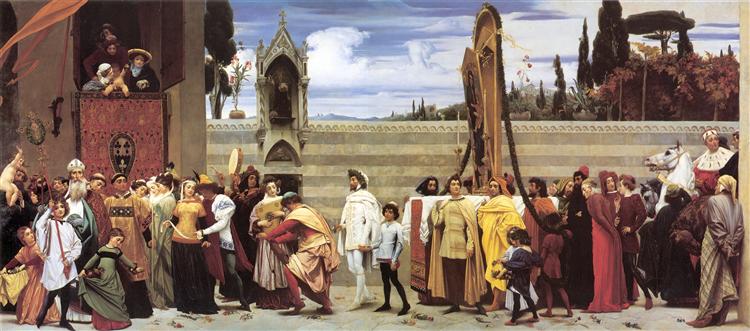Description
The painting "The Celebrated Madonna Of Cimabue Carried In Procession Through The Streets Of Florence", created by Frederic Leighton in 1854, is part of an artistic context where the exploration of history and religion are intertwined with pictorial technique. Leighton, recognized for his skill in the representation of the human figure and for his resplendent approach to the themes of the Renaissance and classical antiquity, manages to capture in this work a moment of collective devotion, a scene that reflects both spirituality and the cultural celebration of the past.
The painting depicts a procession displaying a religious icon, the Virgin, evoking the reverence that Florentine citizens felt towards this important object of worship. The composition is rich and detailed, with a series of characters surrounding the central image. Here, the faces express emotional depth, a mixture of devotion and veneration before the figure of the Virgin, represented in an imposing and dignified manner. The arrangement of the characters and their interaction with the central figure creates a sense of movement, as if the procession were in full swing and attracted both the attention of the faithful and the gaze of the spectator.
Leighton uses a vibrant colour palette, predominantly gold and blue tones, which not only highlight the regality of the Virgin, but also suggest the halo of divinity that is associated with the figure. Light seems to flow from the Virgin, giving her an ethereal aura that contrasts with the darker, more everyday clothing of the characters in the scene. This reinforces the visual hierarchy of the work, where the central figure is not only an object of devotion, but also a symbol of a historical period that Leighton aims to exalt.
In terms of technique, the use of chiaroscuro allows the scene to acquire an almost three-dimensional dimension, emphasizing the textures of the fabrics and the morphology of the bodies. This technical skill aligns with the Pre-Raphaelite movement, which Leighton was influenced by, where attention to detail and the careful representation of nature and the human figure were valued. However, his interpretation is also distinguished by the elegance and theatricality that are characteristic of his academic style.
This work is not only a representation of a specific historical event, but also a reflection on the culture and religion of 13th-century Florence, a tribute to the master Cimabue, whose icons would have been venerated by those flowing through the streets of the city. The work brings to life a tradition that speaks not only of religion, but also of the collective identity of the Florentine community.
Leighton succeeds, with Cimabue's Celebrated Madonna, in creating a bridge between the past and the present, inviting the viewer not only to contemplate the beauty of the work, but to understand the importance of the vergine and its context within Italy's rich artistic history. This work, therefore, should not be seen as just a static representation, but as a living representation of faith, history and culture through the perspective of a Victorian master of art.
KUADROS ©, a famous painting on your wall.
Hand-made oil painting reproductions, with the quality of professional artists and the distinctive seal of KUADROS ©.
Painting reproduction service with satisfaction guarantee. If you are not completely satisfied with the replica of your painting, we will refund 100% of your money.

